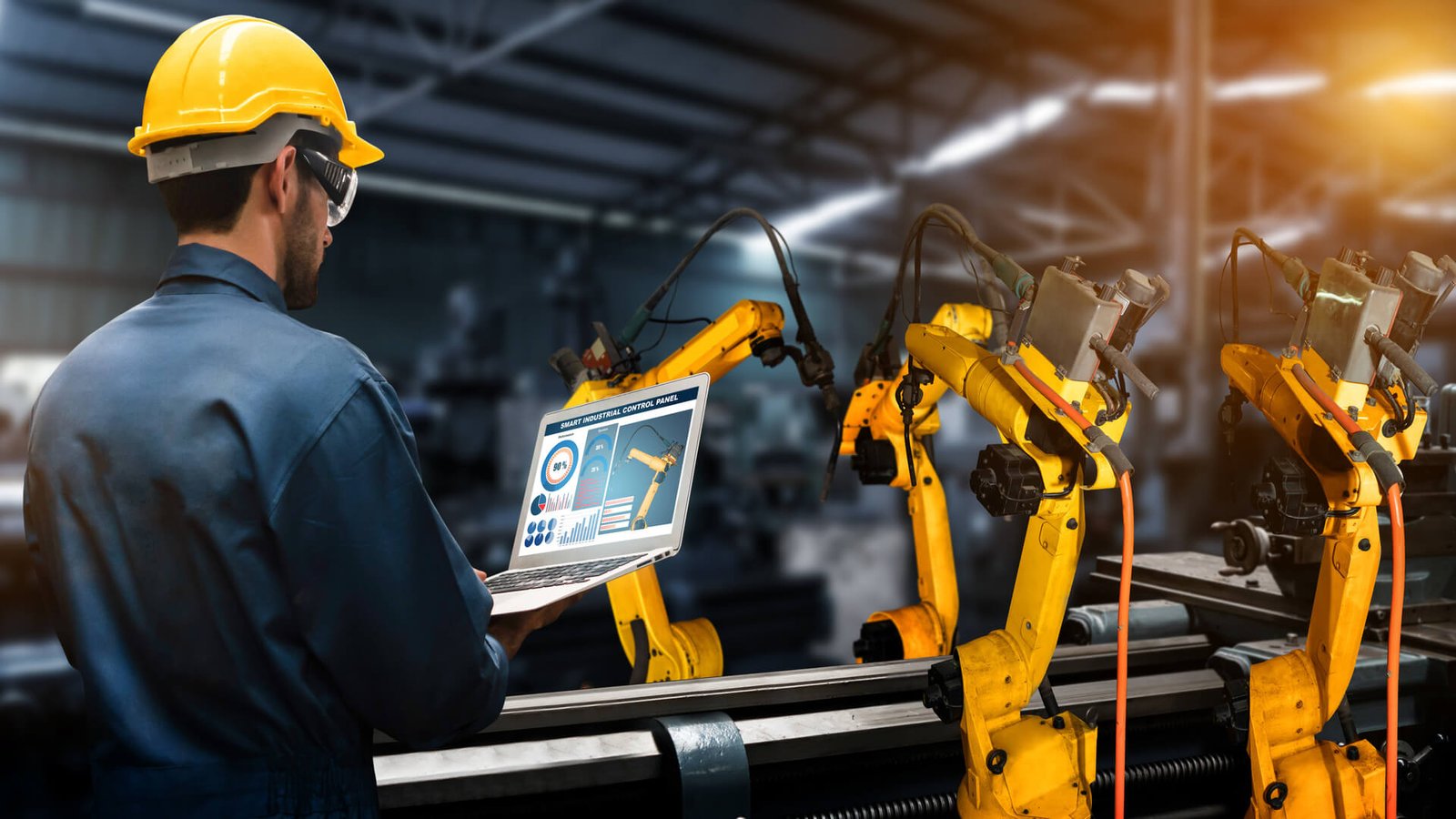
Marketing Trends in 2025
Introduction to 2025 Manufacturing Trends
As the manufacturing sector approaches 2025, it is becoming increasingly evident that a paradigm shift in marketing strategies is on the horizon. The digital revolution is not only reshaping production processes but also the underlying methods manufacturers employ to engage with consumers. Technological advancements, such as artificial intelligence, big data analytics, and automation, are driving this change, providing manufacturers with tools to refine their marketing approaches and cultivate deeper business relationships.
Furthermore, consumer behaviors are evolving rapidly, influenced by factors such as increased access to information and heightened expectations for transparency and ethical practices. Today’s consumers are more informed, empowered, and selective, which means that manufacturers must adapt their marketing initiatives to resonate with a more discerning audience. This requires a deeper understanding of customers’ values, preferences, and habits, shifting focus from traditional marketing techniques to more personalized and meaningful engagement strategies.
Sustainability, in particular, has emerged as a critical consideration for both manufacturers and consumers. The growing urgency surrounding climate change and environmental responsibility is compelling manufacturers to reevaluate their production processes and marketing narratives. Consumers increasingly favor brands that demonstrate a commitment to sustainable practices, prompting manufacturers to integrate eco-friendly initiatives into their marketing campaigns. This alignment of business practices with consumer expectations not only enhances brand loyalty but also establishes a competitive advantage in a crowded marketplace.
Overall, the landscape for manufacturers is evolving dramatically, necessitating an agile and forward-thinking approach to marketing. As we examine the trends shaping the sector in 2025, it is crucial for manufacturers to remain attuned to these shifts, ensuring their strategies are aligned with technological innovations, changing consumer expectations, and a commitment to sustainability.
The Impact of Technology on Manufacturing Marketing
In recent years, the manufacturing industry has undergone significant transformations due to technological advancements, which have profoundly impacted marketing strategies for manufacturers. Automation, artificial intelligence (AI), and big data analytics are at the forefront of these changes, enabling manufacturers to streamline operations while enhancing their marketing efforts. The incorporation of these technologies allows for more efficient processes, targeted campaigns, and improved customer engagement.
Automation plays a crucial role in modernizing marketing within the manufacturing sector. By automating repetitive tasks such as lead nurturing and email campaigns, manufacturers can allocate their resources more effectively. This leads to a dramatic increase in productivity and allows marketing teams to focus on crafting more impactful messages and analyzing their campaign performance. As a result, automation helps create a more cohesive and responsive marketing strategy.
Artificial intelligence is another transformative technology that is reshaping the way manufacturers approach marketing. AI-driven tools can analyze vast amounts of data to identify patterns and predict customer behavior, enabling manufacturers to create more personalized marketing strategies. With this level of insight, manufacturers can tailor their offerings to meet specific customer needs, thereby enhancing customer satisfaction and loyalty.
Moreover, big data analytics provides manufacturers with the capability to collect and interpret comprehensive data sets, encompassing consumer preferences, market trends, and operational efficiencies. By leveraging these insights, manufacturers can develop more targeted marketing campaigns, ensuring they reach their ideal audience effectively. The integration of these technologies ultimately results in more informed decision-making and better allocation of marketing budgets.
Together, these technological advancements are reshaping the landscape of manufacturing marketing. As manufacturers adopt these tools and platforms, they stand to benefit significantly from improved engagement, enhanced operational efficiencies, and more responsive marketing strategies. This evolution indicates a promising future for manufacturers who embrace technology as part of their marketing endeavors.
Evolving Consumer Expectations and Preferences
The landscape of consumer expectations is rapidly transforming as we approach 2025, presenting manufacturers with both challenges and opportunities. Modern consumers are no longer passively receiving information; instead, they are actively seeking out personalized experiences that cater to their unique needs and preferences. This shift emphasizes the growing demand for tailored products and services, encouraging manufacturers to adopt more agile marketing strategies that resonate with individual consumers.
Efficiency has also become a hallmark of consumer interactions with manufacturers. Today’s consumers prefer streamlined purchasing processes, quick responses to inquiries, and swift delivery of products. They expect brands to leverage technology to enhance their shopping experiences, leading to higher standards of service and immediate access to information. Consequently, manufacturers must invest in digital tools and channels that facilitate these efficient interactions, such as artificial intelligence-driven customer support and advanced logistics solutions.
Transparency is another critical factor shaping consumer expectations in 2025. Customers are increasingly scrutinizing manufacturers’ practices, from sourcing materials to ethical labor practices. They seek brands that are not only responsible in production but also honest in their marketing efforts. Manufacturers must prioritize honesty and openness, providing consumers with insights into their operations, product sourcing, and environmental impact. This level of transparency not only builds trust but can also establish a competitive edge in a crowded marketplace.
Understanding these evolving preferences is crucial for manufacturers aiming to thrive in this new era. Adapting marketing strategies to meet personalized needs, enhance efficiency, and promote transparency will be decisive in establishing robust consumer relationships. As competition intensifies, forward-thinking manufacturers will prioritize these factors to stay relevant and responsive to the changing market dynamics.
The Rise of Sustainability in Manufacturing Marketing
As consumer awareness of ecological issues continues to grow, sustainability has emerged as a pivotal marketing trend within the manufacturing sector. This evolution is driven by increasing demands from consumers for eco-friendly practices and products, compelling manufacturers to adapt their marketing strategies accordingly. Companies that embrace sustainability are not only recognizing the ethical implications but are also discovering that there is a profound market advantage in aligning their practices with consumer values.
Sustainable sourcing, which involves procuring raw materials in an environmentally and socially responsible manner, is becoming an integral aspect of manufacturing. By focusing on ethically sourced materials, manufacturers can reduce their impact on the environment while appealing to consumers who prioritize sustainability. Marketing strategies should highlight the origin of materials, the production processes used, and the steps taken to minimize environmental damage. Indeed, consumers are increasingly likely to support brands that demonstrate a commitment to sustainable sourcing.
Moreover, the production processes themselves are being scrutinized. Manufacturers are urged to adopt practices that reduce waste, conserve energy, and lower carbon emissions. Implementing advanced manufacturing technologies, such as automation and the Internet of Things (IoT), not only enhances operational efficiency but also facilitates a transition toward more sustainable practices. Marketers can leverage these innovations in their narratives, showcasing how new technologies dynamically contribute to sustainable manufacturing efforts.
Transparency plays a crucial role in effective marketing centered on sustainability. Consumers are becoming adept at discerning genuine sustainability claims from mere greenwashing. Therefore, manufacturers must provide clear and verifiable evidence of their sustainability endeavors. By doing so, they build trust and loyalty among their customer base, effectively distinguishing themselves in a competitive marketplace.
Data-Driven Marketing Strategies
As we look ahead to 2025, the importance of data analytics in forming effective marketing strategies is increasingly recognized, particularly for manufacturers. In an era where information is abundant, manufacturers can leverage data analytics to glean valuable insights into evolving market trends and customer behavior. By tapping into various data sources, including customer interactions, market research, and sales figures, manufacturers can identify patterns that inform strategic decisions.
Data-driven marketing fosters a deeper understanding of the target audience. Manufacturers can utilize advanced analytics tools to segment their customers based on demographics, purchasing behavior, and preferences. This segmentation allows for more nuanced targeting, ensuring that marketing efforts reach the appropriate audiences with relevant messages. By analyzing the effectiveness of past campaigns, manufacturers can fine-tune their strategies, allocating resources to the most impactful channels and content types.
Additionally, the utilization of data enables manufacturers to create personalized marketing messages that resonate with their audience. Personalization is becoming increasingly vital in a competitive landscape, as customers expect brands to understand their individual needs. Through data analytics, manufacturers can tailor their communication—be it through email, social media, or advertisements—ensuring that the content aligns with the interests and preferences of their target customers.
Furthermore, predictive analytics can empower manufacturers to anticipate future trends and customer requirements. By analyzing historical data and current market factors, businesses are equipped to make proactive adjustments to their marketing strategies. This dynamic approach not only enhances the effectiveness of campaigns but also strengthens the overall customer relationship. Overall, the integration of data analytics in crafting marketing strategies is not just an advantage; it represents a fundamental shift towards more informed decision-making for manufacturers in 2025.
The Role of Digital Marketing in the Manufacturing Sector
In recent years, digital marketing has emerged as a critical component of the manufacturing sector, significantly altering how manufacturers engage with their target audiences. With the exponential growth of online platforms, traditional marketing methods are being complemented—and in some cases, replaced—by digital strategies that enhance visibility and connectivity. Manufacturers are increasingly recognizing the need to adopt digital marketing channels such as social media, email campaigns, and search engine optimization (SEO) to stay competitive in an evolving marketplace.
Social media marketing has become an essential tool for manufacturers, offering a cost-effective way to reach a broader audience. Platforms such as LinkedIn, Facebook, and Instagram provide channels for manufacturers to showcase their products, share insights, and connect with potential clients. By leveraging targeted advertising, companies can effectively reach specific demographics, foster engagement, and create brand awareness. This approach allows manufacturers to showcase their innovation while establishing authority within their industry.
Email campaigns remain a powerful method of communication in the manufacturing sector. These campaigns can be tailored to foster relationships with existing clients or nurture leads. Factory newsletters, product updates, and promotional offers sent via email can drive engagement and build loyalty among customers. Personalized email strategies not only enhance customer relationships but can also improve conversion rates, leading to increased profitability for manufacturers.
Search engine optimization (SEO) plays a pivotal role in enhancing online visibility. By optimizing website content, manufacturers can improve their ranking on search engine results pages, making it easier for potential customers to discover their offerings. Strategies such as keyword optimization, high-quality content creation, and backlinking are essential for driving organic traffic to manufacturers’ websites. As competition intensifies, a robust SEO strategy becomes indispensable for sustaining growth in an increasingly digital world.
B2B Marketing Innovations for Manufacturers
As we progress into 2025, the landscape of B2B marketing for manufacturers is undergoing significant transformations, driven by advancements in technology and evolving market demands. To stay competitive, manufacturers must embrace innovative strategies tailored to enhance their marketing effectiveness and build robust partnerships. One of the most effective strategies is account-based marketing (ABM), which focuses on targeting specific high-value accounts rather than adopting a one-size-fits-all approach. By personalizing marketing efforts and aligning content with the specific needs of each key account, manufacturers can improve engagement and foster stronger relationships.
Incorporating sophisticated customer relationship management (CRM) tools is another critical innovation for manufacturers. These tools facilitate the gathering and analysis of customer data, enabling manufacturers to understand their clients’ preferences and behaviors better. With this data-driven approach, businesses can tailor their marketing communications, ultimately leading to enhanced customer satisfaction and loyalty. A well-integrated CRM system not only streamlines interactions with current customers but also aids in identifying new business opportunities, ensuring comprehensive and effective outreach.
Moreover, manufacturers can leverage digital platforms to strengthen their presence within the B2B landscape. Utilizing social media channels, content marketing, and email campaigns provides opportunities to engage with industry stakeholders and build lasting partnerships. By sharing valuable insights, case studies, and industry trends, manufacturers can position themselves as thought leaders in their respective fields, thereby attracting potential clients and partners. Additionally, utilizing webinars and virtual events can help manufacturers showcase their expertise and foster interactive discussions with prospects.
Overall, embracing these innovations in B2B marketing will enable manufacturers to adapt to the changing business environment, effectively engage with other businesses, and ultimately drive growth in 2025 and beyond.
Leveraging Influencer Partnerships in Manufacturing
In recent years, influencer marketing has emerged as a powerful tool across various industries, including the manufacturing sector. Traditionally associated with consumer brands, influencer partnerships can significantly enhance the credibility of manufacturers, bridging the gap between technical expertise and market reach. By collaborating with industry experts and thought leaders, manufacturers can tap into their established audiences, promoting their innovations and reinforcing their authority within the field.
When considering influencer partnerships, it is crucial for manufacturers to identify individuals whose values and expertise align with their own brand objectives. Selecting the right influencers can greatly impact the success of a campaign. These influencers should possess not only a significant following but also a deep understanding of the manufacturing landscape. Engaging with influencers who have a proven track record in the industry or related fields can provide manufacturers with authentic endorsements that resonate with potential customers.
Once partnerships are established, measuring the success of influencer collaborations becomes vital for continuous improvement. Key performance indicators (KPIs) such as engagement rates, reach, and conversions can provide insights into how effectively the campaign is performing. Additionally, monitoring brand sentiment through social listening can reveal valuable feedback about the public’s perception of the brand and its products. By analyzing these metrics, manufacturers can optimize their influencer marketing strategies to enhance future campaigns.
As the manufacturing landscape evolves and digital platforms become increasingly integrated into business operations, leveraging influencer partnerships will undoubtedly become a standard practice. This approach not only fosters trust and credibility but also paves the way for innovative marketing strategies that align with the expectations of a modern audience. In the ever-competitive market landscape of 2025, influencer marketing will serve as a key driver for growth and brand recognition for manufacturers.
Conclusion: Preparing for the Future of Manufacturing Marketing
The landscape of manufacturing marketing is evolving rapidly, with various trends shaping its future. As we look toward 2025, it is essential for manufacturers to recognize and adapt to these emerging trends in order to remain competitive and responsive to market demands. One of the most significant shifts is the transition towards digitalization, which has transformed how businesses interact with their customers. Embracing advanced technologies such as artificial intelligence, machine learning, and automation can improve efficiencies and personalize customer experiences.
Another critical marketing trend is the emphasis on sustainability. As consumers become more environmentally conscious, manufacturers are encouraged to adopt sustainable practices not only in their production processes but also in their marketing strategies. This includes transparently communicating sustainability efforts and products that appeal to eco-friendly consumers. Companies that prioritize sustainability will likely strengthen their brand loyalty, attracting a growing demographic of conscious buyers.
Furthermore, harnessing the power of data analytics will be vital for manufacturers to understand customer behavior better. Analyzing trends and feedback can enable businesses to craft targeted marketing strategies, ensuring their offerings align with evolving consumer preferences. This adaptability is key in a marketplace that values innovation and responsiveness.
Lastly, cultivating a customer-centric approach will be indispensable for future success. Manufacturers must prioritize creating meaningful relationships with their customers by addressing their needs, preferences, and pain points. By focusing on customer engagement and feedback, manufacturers can develop products and services that resonate with their audience.
In summary, as manufacturers navigate the complex landscape of 2025, embracing these marketing trends will be critical to thriving and achieving long-term success. By prioritizing innovation, sustainability, data-driven insights, and customer-centric strategies, businesses can confidently prepare for the future. The ability to adapt and remain Proactive will determine the manufacturers that succeed in this new era.





